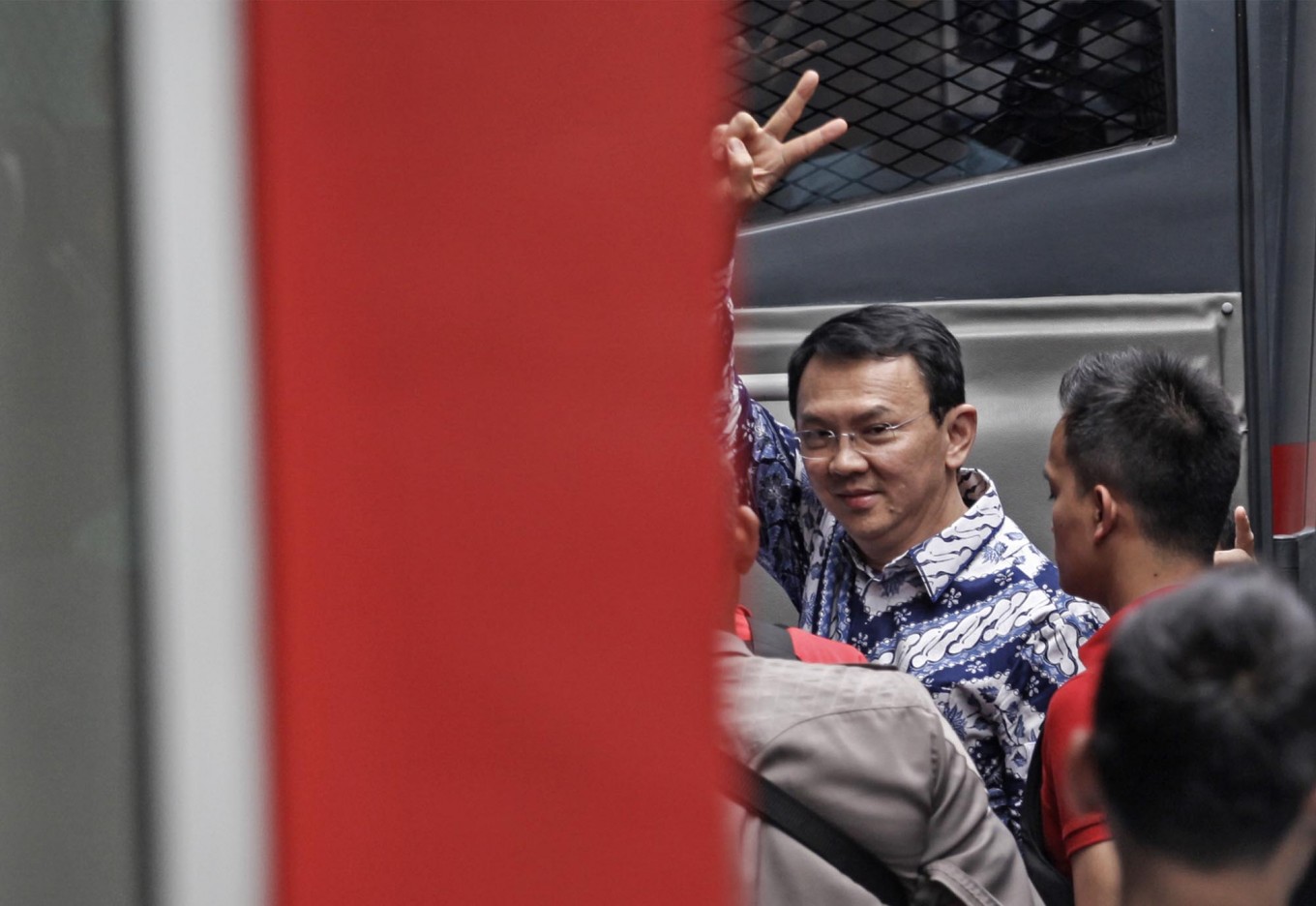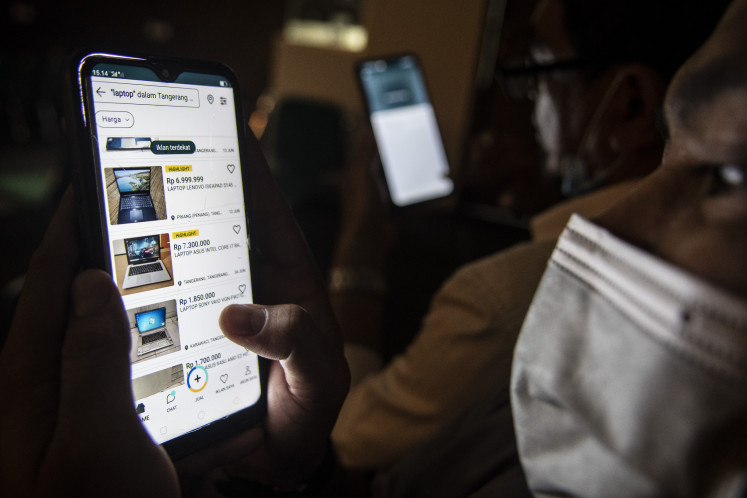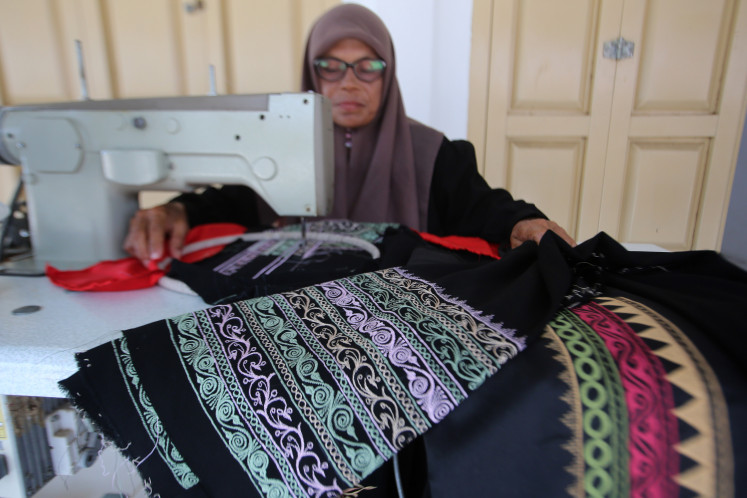Popular Reads
Top Results
Can't find what you're looking for?
View all search resultsPopular Reads
Top Results
Can't find what you're looking for?
View all search resultsAhok, sex, and a ghost story of democracy
While those two cases are completely unrelated, they reflect a darker side of Indonesia’s democracy; a ghost story that haunts and puts its legitimacy at stake.
Change text size
Gift Premium Articles
to Anyone
F
irst things first, this title is inspired by the writer-activist Arundhati Roy’s non-fiction, Capitalism: A Ghost Story (2015), which unveils the dark side of Indian democracy. Through privatization and other interventions, mega-corporations steal and plunder the country’s natural resources and thus exacerbate economic inequality. Just a few weeks after I read this book, outgoing Jakarta Governor Basuki “Ahok” Tjahaja Purnama was jailed for two years for blasphemy against Islam.
Behind the protests and actions and debate on blasphemy law, the wars on homosexuality and/or LGBT still continues. Indonesian police raided a “gay sex party” in Surabaya, East Java, arrested 14 men, and forced them to undergo HIV tests, which violated their rights to privacy. They face charges of infringing the 2008 Pornography Law and the 2008 Electronic Information and Transaction Law (ITE), prohibiting the distribution of pornographic and/or indecent material. The police found and confiscated condoms, mobile phones, and a flash drive containing porn videos, reports said.
While those two cases are completely unrelated, they reflect a darker side of Indonesia’s democracy; a ghost story that haunts and puts its legitimacy at stake.
The fall of Soeharto’s authoritarian regime in 1998 has led to the greater protection of freedom of press and expression. Civil society organizations flourished, giving promises for the fulfillment of human rights that were problematic under the New Order.
Unfortunately, the unfolding stories are too much of a contrast. Although democracy is built on the protection of minority groups, this proposition is not always respected and embodied. Some scholars argue that democratization and the proliferation of civil society movements do not always guarantee the quality of democracy itself.
Daily power dynamics and contestations among political actors mark constant ideological struggles to define the contours of the regime. Indonesia’s transition to democracy has also led the previously suppressed fundamentalist Islamic political groups to flourish openly and exert their power, with many cities and regencies adopting “moral-based regulations” or sharia-inspired bylaws.
The scholar Kathryn Robinson in Masculinity, Sexuality, and Islam (2015) asserts that political Islam actors exploit decentralization to enact sharia-based regulations. With their greater political power, politicians of any hue see them as potential supporters and constituents for their own interests. Hence, this shift has also changed the way of regulating and policing people, particularly those who do not conform to the formal norms of the state and of the majority. If in the previous regime, state-centered power and surveillance was inevitable, the current regime of controls are deployed and reverberates throughout dispersed policies, creating new modes of policing.
While homosexuality remains illegal here, the loose, malleable, and subjective definition of pornography of the 2008 Pornography Law so far has been a powerful weapon to outlaw homosexuality practices and interfere in individual private spaces. Last year a male couple in Manado, North Sulawesi, was arrested after a photo of them kissing was uploaded on Facebook and went viral. Similar with the recent gay arrests in Surabaya, this couple was at risk of being charged under the Pornography Law and the cyberlaw.
The subjective interpretation of the definition of ‘pornography’ and ‘indecency’ (kesusilaan) in those policies has led the barbarous application of those laws to police sexual minorities groups by equating their sexual practices or affective expressions with pornography and indecency. The ban on gay social networking last year also followed and applied the same logic. Nevertheless, heterosexual couples, despite their explicit displays of affections and sexual expressions in public and social media, remains untouchable under these policies. Equally important, several local ordinances also police homosexuality by conflating it with prostitution and immoral behavior. In Aceh, homosexuality is explicitly punishable through sharia bylaws. In March, two young men were arrested and on Tuesday were punished with 83 strokes of the cane.
Sex and religion are indeed two distant poles. Although both are supposed to be parts of individual privacy, these two are also increasingly perceived as public matters.
The pressures from religious conservative groups could not also be ignored easily, since they have become influential in pushing such bylaws to politicize and criminalize minorities. As a consequence, regulating and policing sex and religion are also inescapable from Indonesia’s social and political landscape.
The laws used to criminalize “blasphemy” — the 1965 Blasphemy Law and Article 156 of the Criminal Code—have been there for a long time. Nonetheless, according to Ismail Hasani from Setara Institute, during the democratic era, the number of cases charged under the blasphemy law has so far reached 50 cases, compared with only 10 cases before 1998.
Further, the laws could be applied to criminalize religious minorities deemed deviant of the dominant interpretation of religion, like Ahmadiyah people. While Ahok is now found guilty, public condemnation against other faiths by equating them with kafir (infidel) escapes similar charges. It is thus no exaggeration to interpret the current incidents during the Jakarta gubernatorial election as an exploitation and politicization of religion.
Drawing on French philosopher Michel Foucault’s insights about power and surveillance, what happened to Ahok and those gay people reminds us about the evolving surveillance and control modes, in this supposedly “more progressive” regime. Surveillance and control is now dispersed and reverberates throughout different policies that could easily be exploited and politicized by groups with particular interests.
Sex and religion are no longer one’s private business; it is getting scrutinized and regulated, as the spectral “power” haunts and seeps through the walls of our very own private spaces.
As our democracy reveals more of its darker sides blanketing it into a shadowy night, as Arundhati Roy said in the closing of her chapter, “perhaps it is time for us to take back the night”.
---------------
We are looking for information, opinions, and in-depth analysis from experts or scholars in a variety of fields. We choose articles based on facts or opinions about general news, as well as quality analysis and commentary about Indonesia or international events. Send your piece to academia@jakpost.com. For more information click here.










